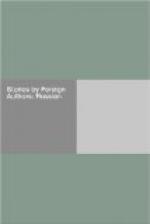Our tent was pitched not far from the guns on a place high and dry, from which we had a remarkably extended view. Near the tent, on a cleared space, around the battery itself, we had our games of skittles, or chushki. The obliging soldiers had made for us rustic benches and tables. On account of all these amusements, the artillery officers, our comrades, and a few infantry men liked to gather of an evening around our battery, and the place came to be called the club.
As the evening was fine, the best players had come, and we were amusing ourselves with skittles [Footnote: Gorodki]. Ensign D., Lieutenant O., and myself had played two games in succession; and to the common satisfaction and amusement of all the spectators, officers, soldiers, and servants [Footnote: Denshchiki ] who were watching us from their tents, we had twice carried the winning party on our backs from one end of the ground to the other. Especially droll was the situation of the huge fat Captain S., who, puffing and smiling good-naturedly, with legs dragging on the ground, rode pickaback on the feeble little Lieutenant O.
When it grew somewhat later, the servants brought three glasses of tea for the six men of us, and not a spoon; and we who had finished our game came to the plaited settees.
There was standing near them a small bow-legged man, a stranger to us, in a sheepskin jacket, and a papakha, or Circassian cap, with a long overhanging white crown. As soon as we came near where he stood, he took a few irresolute steps, and put on his cap; and several times he seemed to make up his mind to come to meet us, and then stopped again. But after deciding, probably, that it was impossible to remain irresolute, the stranger took off his cap, and, going in a circuit around us, approached Captain S.
“Ah, Guskantinli, how is it, old man?” [Footnote: Nu chto, batenka,] said S., still smiling good-naturedly, under the influence of his ride.
Guskantni, as S. called him, instantly replaced his cap, and made a motion as though to thrust his hands into the pockets of his jacket; [Footnote: Polushubok, little half shuba, or fur cloak.] but on the side toward me there was no pocket in the jacket, and his small red hand fell into an awkward position. I felt a strong desire to make out who this man was (was he a yunker, or a degraded officer?), and, not realizing that my gaze (that is, the gaze of a strange officer) disconcerted him, I continued to stare at his dress and appearance.
I judged that he was about thirty. His small, round, gray eyes had a sleepy expression, and at the same time gazed calmly out from under the dirty white lambskin of his cap, which hung down over his face. His thick, irregular nose, standing out between his sunken cheeks, gave evidence of emaciation that was the result of illness, and not natural. His restless lips, barely covered by a sparse, soft, whitish moustache, were constantly changing their shape as though they




